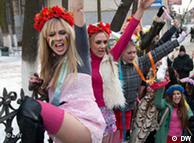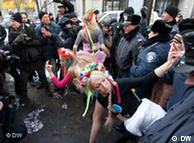Vadim Kastelli shot a film about domestic violence ... in the land of Amazons and militant Cossack wives
By Anna SLIESARIEVA
For anybody committed to European values, violence against women is a barbaric act. Incidentally, in Ukraine, a country known for its Amazons and militant Cossack wives, this “tradition” should be seen as alien, too. Obviously, it was brought here by some other culture, some other civilization...
Let’s recall that the first prize in this year’s World Press Photo Contest was awarded to the portrait of an Afghan girl, Bibi Aisha, who was mutilated by her own husband and father. This photo was taken by Jodi Bieber and it shocked the entire world, including Ukrainians, who are probably unaware that one in five Ukrainian women suffers from domestic violence, but is too ashamed to talk about it. To get this problem to surface in public debate, director Vadim Kastelli (known primarily as one of the authors of the film NATO: Friend or Foe) has addressed the issue in his documentary Battered Women. The film tells the stories of three Ukrainian women who have become victims of domestic violence. At the end of the road, one of them was barely saved by doctors, the other killed her tormenter, while the third found the inner strength to leave her abuser. Psychologists and lawyers, local and foreign experts analyze the situation, while celebrities unexpectedly tell their tales in this documentary.
Having learned the sad statistics, one understands why Kastelli chose this topic. One in five Ukrainian women experiences domestic violence, which makes for almost 4,600,000 casualties.
“Our statistics differ little from global ones,” Kastelli assures. “When we say that women are beaten everywhere, in housing projects as well as in palaces, it seems only a phrase, but we talked to pop stars and actresses, and they admitted to having suffered from violence, too.”
Of course, the issue exists not only in less than affluent countries like Ukraine. But some European nations formally recognize domestic violence as a crime, not a private matter, and perpetrators receive psychological treatment.
“European countries have long understood that open discussion is needed to overcome this phenomenon. When the social mechanisms in question function normally, where a woman knows that she can call the police and they will answer her call, where public bodies react to violence, where an abusive husband is publicly condemned and can be fired from his job – there a woman has it much easier. We have to go that way, outlined by the civilized nations of Europe,” Kastelli maintains.
Practice shows that Ukrainian women are embarrassed to publicly admit that they are victims of domestic violence.
“We have the infamous saying ‘an unbeaten woman is similar to an unriveted scythe.’ It is something that lies really deep in us,” Kastelli explains. “The situation was exacerbated during the Soviet years, when any private initiative was destroyed, while passivity was the norm.”
However, now Ukraine has special shelters for abused women and a helpline where one can ask for help. In addition to temporary housing, the victims get psychological, legal, informational assistance and other support. Nor should we forget about the number “102” [the Ukrainian police help line – Ed.].
“You cannot say that violence against women is a Slavic trait. Poles are Slavs all the same, but their situation is much better, especially after the country joined the EU. Any steps toward civilization are an improvement,” the director emphasizes.
Kastelli’s film will soon premiere on the First National TV channel.
COMMENTARIES
Nina POTARSKA, historian, political scientist and social activist:
“The problem of violence against women can not be separated from its cultural, political or economic context. The economic context is the most important. The economy is the core of the issue, other layers come later on; they include cultural policy and general gender ignorance of society, understatement of the importance of gender problems, stereotypical female images in the media space, reflecting sexism and depict the women’s role as secondary as compared to men.”
Nadia PARFAN, the Visual Culture Research Center at the National University Kyiv-Mohyla Academy:
“The defenselessness of women is, above all, a social problem, because violence against women is widespread, principally, within lower-status, poorer groups with unstable economic situations. Their cultural level is a result of their situation. The government has shown a lack of interest in protecting its citizens. Commercial media do not set educational objectives and only produce stereotypes ... To understand that the problem exists, one needs education, one must be interested, read, think about it...”
Olena Shevchenko, chairman of the NGO Insight:
“Of course, this complex problem is worth discussing; it is very poorly covered in the media, as it is not considered a pressing issue. So the public remains mostly uninformed about the shocking statistics of violence against women and the reasons for it. These reasons are rooted in gender inequality. Personally I have more confidence in the power of civil society, which is united, demands its rights be respected, and achieves its objectives. We so often hear talk about political will, as though the powers-that-be will decide to give us some rights, but this will is usually only political rhetoric.”
http://www.day.kiev.ua/206766







 Project Kesher
Project Kesher